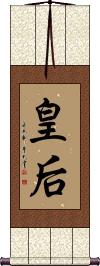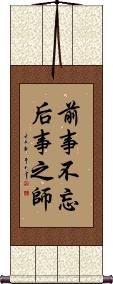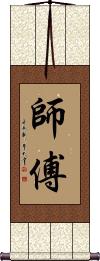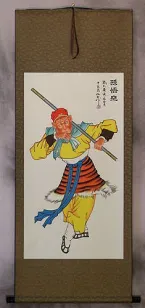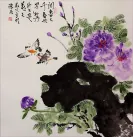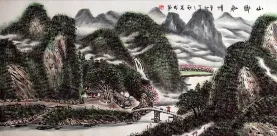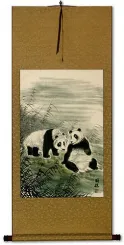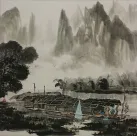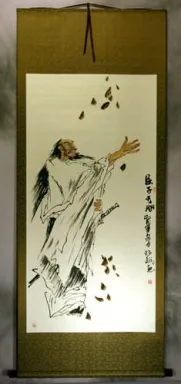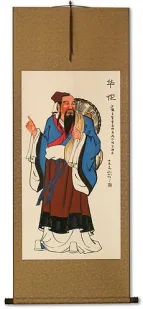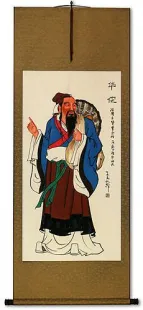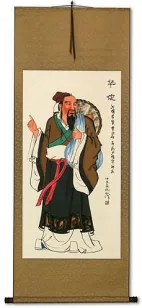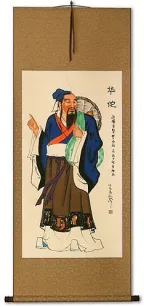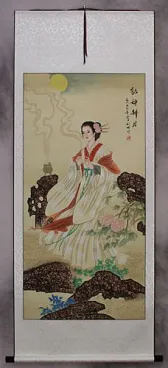Many custom options...
And formats...

Not what you want?
Try other similar-meaning words, fewer words, or just one word.
China King in Chinese / Japanese...
Buy a China King calligraphy wall scroll here!
Personalize your custom “China King” project by clicking the button next to your favorite “China King” title below...
1. Empress
4. The one who retreats 50 paces mocks the one to retreats 100
Empress
皇后 is the title of empress/emperess, the female form of the emperor.
皇后 is used in Chinese, Japanese Kanji, and old Korean Hanja.
While the emperor's reign was for life, if he died, his wife would hold his power. In this case, a woman was the ultimate ruler of the greater part of East Asia (now China) until her death and the succession of the emperor's firstborn son to lead the empire. Numerous times in various Chinese dynasties, an empress took power in this way.
The first character means emperor by itself.
The second character alone can mean “wife of an emperor or king” (the first character clarifies that we are talking about an empress and not a queen). It can also mean sovereign or last offspring, depending on context.
Note: In some books, this word is translated as queen. While only incorrect if you get technical (because an empress is theoretically a higher level than a queen), the meaning is very similar.
皇后 is sometimes used for the title of queen, but more technically, this is the wife of the emperor (a higher level than a queen).
Animal Kingdom
動物王國 is literally what it says.
There is even a TV show in China that is similar to Wild Kingdom or what you would currently see on the Discovery Channel that has this same title.
For your information: In the Chinese way of thinking, the Tiger is the king of the animal kingdom (lions are not native to China, so the tiger took the role that we have given to the lion in our western way of thinking).
The modern Japanese version has a slight variation on the last character (国 instead of 國). Let me know if you want the modern Japanese version (國 would be considered the old or traditional version).
Better Late Than Never
It's Never Too Late Too Mend
Long ago in what is now China, there were many kingdoms throughout the land. This time period is known as “The Warring States Period” by historians because these kingdoms often did not get along with each other.
Sometime around 279 B.C. the Kingdom of Chu was a large but not particularly powerful kingdom. Part of the reason it lacked power was the fact that the King was surrounded by “yes men” who told him only what he wanted to hear. Many of the King's court officials were corrupt and incompetent which did not help the situation.
The King was not blameless himself, as he started spending much of his time being entertained by his many concubines.
One of the King's ministers, Zhuang Xin, saw problems on the horizon for the Kingdom, and warned the King, “Your Majesty, you are surrounded by people who tell you what you want to hear. They tell you things to make you happy and cause you to ignore important state affairs. If this is allowed to continue, the Kingdom of Chu will surely perish, and fall into ruins.”
This enraged the King who scolded Zhuang Xin for insulting the country and accused him of trying to create resentment among the people. Zhuang Xin explained, “I dare not curse the Kingdom of Chu but I feel that we face great danger in the future because of the current situation.” The King was simply not impressed with Zhuang Xin's words.
Seeing the King's displeasure with him and the King's fondness for his court of corrupt officials, Zhuang Xin asked permission from the King that he may take leave of the Kingdom of Chu, and travel to the State of Zhao to live. The King agreed, and Zhuang Xin left the Kingdom of Chu, perhaps forever.
Five months later, troops from the neighboring Kingdom of Qin invaded Chu, taking a huge tract of land. The King of Chu went into exile, and it appeared that soon, the Kingdom of Chu would no longer exist.
The King of Chu remembered the words of Zhuang Xin and sent some of his men to find him. Immediately, Zhuang Xin returned to meet the King. The first question asked by the King was “What can I do now?”
Zhuang Xin told the King this story:
A shepherd woke one morning to find a sheep missing. Looking at the pen saw a hole in the fence where a wolf had come through to steal one of his sheep. His friends told him that he had best fix the hole at once. But the Shepherd thought since the sheep is already gone, there is no use fixing the hole.
The next morning, another sheep was missing. And the Shepherd realized that he must mend the fence at once. Zhuang Xin then went on to make suggestions about what could be done to reclaim the land lost to the Kingdom of Qin, and reclaim the former glory and integrity of the Kingdom of Chu.
The Chinese idiom shown above came from this reply from Zhuang Xin to the King of Chu almost 2,300 years ago.
It translates roughly into English as...
“Even if you have lost some sheep, it's never too late to mend the fence.”
This proverb, 亡羊补牢犹未为晚, is often used in modern China when suggesting in a hopeful way that someone change their ways, or fix something in their life. It might be used to suggest fixing a marriage, quitting smoking, or getting back on track after taking an unfortunate path in life among other things one might fix in their life.
I suppose in the same way that we might say, “Today is the first day of the rest of your life” in our western cultures to suggest that you can always start anew.
Note: This does have Korean pronunciation but is not a well-known proverb in Korean (only Koreans familiar with ancient Chinese history would know it). Best if your audience is Chinese.
The one who retreats 50 paces mocks the one to retreats 100
The pot calls the kettle black
五十步笑百步 is a Chinese proverb that means the one who retreats 50 paces mocks the one who retreats 100 paces.
During the Warring States Period of what is now China (475 - 221 B.C.), the King of Wei was in love with war. He often fought with other kingdoms just for spite or fun.
One day, the King of Wei asked the philosopher Mencius, “I love my people, and all say I do the best for them. I move the people from famine-stricken areas to places of plenty and transport grains from rich areas to the poor. Nobody goes hungry in my kingdom, and I treat my people far better than other kings. But why does the population of my kingdom not increase, and why does the population of other kingdoms not decrease?”
Mencius answered, “Since you love war, I will make this example: When going to war, and the drums beat to start the attack, some soldiers flee for their lives in fear. Some run 100 paces in retreat, and others run 50 steps. Then the ones who retreated 50 paces laugh and taunt those who retreated 100 paces, calling them cowards mortally afraid of death. Do you think this is reasonable?
The King of Wei answered, “Of course not! Those who run 50 paces are just as timid as those who run 100 paces.”
Mencius then said, “You are a king who treats his subjects better than other kings treat their people, but you are so fond of war that your people suffer from great losses in battle. Therefore, your population does not grow. While other kings allow their people to starve to death, you send your people to die in war. Is there any difference?”
This famous conversation led to the six-character proverb shown here. It serves as a warning to avoid hypocrisy. It goes hand-in-hand with the western phrase, “The pot calls the kettle black,” or the Biblical phrase, “Before trying to remove a splinter from your neighbor's eye, first remove the plank from your own eye.”
Past experience is the teacher for the future
Past events not forgotten serve as teachers for later events.
The most literal translation to English of this ancient 前事不忘后事之师 Chinese proverb is:
“Past events not forgotten serve as teachers for later events.”
However, it's been translated several ways:
Don't forget past events, they can guide you in the future.
Benefit from past experience.
Past experience, if not forgotten, is a guide for the future.
Past calamity is my teacher.
A good memory for the past is a teacher for the future.
The remembrance of the past is the teacher of the future.
If one remembers the lessons of the past; They will serve as a guide to avoid mistakes in the future.
The origin:
This proverb comes from the 5th century B.C., just before the Warring States Period in the territory now known as China.
The head of the State of Jin, Zhi Bo, seized power in a coup. He did this with help from the armies of the State of Han and Wei. Instead of being grateful for the help from Han and Wei, he treacherously took the land of Han and Wei. Never satisfied, Zhi Bo employed the armies of Han and Wei to attack and seize the State of Zhao.
The king of Zhao took advice from his minister Zhang Mengtan and secretly contacted the Han and Wei armies to reverse their plans and attack the army of Zhi Bo instead. The plan was successful, and the State of Zhao was not only saved but was set to become a powerful kingdom in the region.
Zhang Mengtan immediately submitted his resignation to a confused king of Zhao. When asked why, Zhang Mengtan said, “I've done my duty to save my kingdom, but looking back at past experience, I know sovereign kings are never satisfied with the power or land at hand. They will join others and fight for more power and more land. I must learn from past experiences, as those experiences are the teachers of future events.”
The king could not dispute the logic in that statement and accepted Zhang Mengtan's resignation.
For generations, the State of Zhao continued to fight for power and land until finally defeated and decimated by the State of Qin (which led to the birth of the Qin Dynasty in 221 B.C.).
Master / Skilled Worker
Secondary version of Sifu
師傅 is “sifu” as in the “master” in the context of martial arts.
But two sifu titles are floating around. This one can simply mean “skilled worker.”
Historically, this term has been used for many things, such as “The tutor of a king or emperor.” But now it's more commonly used to mean master worker or qualified worker.
Currently, within the field of skilled labor, a master (Shifu) is higher than a journeyman and is considered to be one worthy of teaching others.
Note: In the 1970s and 1980s, this term was used as a common form of polite address between people. You might say, “master, do you know where Tian'anmen Square is?” to a person on the street at that time. This usage has almost passed; however, for some reason, people still often refer to taxi cab drivers as “master” in China (though I think/hope this is fading).
In Mandarin Chinese, this is pronounced like “Sure Foo,” and in Cantonese, like “See Foo.”
The second character is the difference between this sifu and the other. In this case, the second character by itself means tutor, instructor, or teacher.
This in-stock artwork might be what you are looking for, and ships right away...
Gallery Price: $286.00
Your Price: $158.88
South China River Boat
Landscape Painting
Discounted Blemished
Gallery Price: $27.00
Your Price: $15.00
Gallery Price: $63.00
Your Price: $34.88
Gallery Price: $200.00
Your Price: $79.88
Gallery Price: $200.00
Your Price: $79.88
Gallery Price: $200.00
Your Price: $79.88
Gallery Price: $200.00
Your Price: $79.88
Gallery Price: $55.00
Your Price: $19.88
Not the results for china king that you were looking for?
Below are some entries from our dictionary that may match your china king search...
| Characters If shown, 2nd row is Simp. Chinese |
Pronunciation Romanization |
Simple Dictionary Definition |
觀世音 观世音 see styles |
guān shì yīn guan1 shi4 yin1 kuan shih yin Kanzeon かんぜおん |
More info & calligraphy: Guan Shi Yin: Protector Of Life(out-dated kanji) Avalokiteshvara (Bodhisattva); Avalokitesvara; Kannon; Kwannon; Guanyin; Buddhist deity of compassion Regarder of the world's sounds, or cries, the so-called Goddess of Mercy; also known as 觀音; 觀世音善薩; 觀自在 (觀世自在); 觀尹; 光世音 (the last being the older form). Avalokiteśvara, v. 阿 8. Originally represented as a male, the images are now generally those of a female figure. The meaning of the term is in doubt; it is intp. as above, but the term 觀自在 (觀世自在) accords with the idea of Sovereign Regarder and is not associated with sounds or cries. Guanyin is one of the triad of Amida, is represented on his left, and is also represented as crowned with Amida; but there are as many as thirty-three different forms of Guanyin, sometimes with a bird, a vase, a willow wand, a pearl, a 'thousand' eyes and hands, etc., and, when as bestower of children, carrying a child. The island of Putuo (Potala) is the chief centre of Guanyin worship, where she is the protector of all in distress, especially of those who go to sea. There are many sūtras, etc., devoted to the cult, but its provenance and the date of its introduction to China are still in doubt. Chapter 25 of the Lotus Sūtra is devoted to Guanyin, and is the principal scripture of the cult; its date is uncertain. Guanyin is sometimes confounded with Amitābha and Maitreya. She is said to be the daughter of king Śubhavyūha 妙莊王, who had her killed by 'stifling because the sword of the executioner broke without hurting her. Her spirit went to hell; but hell changed into paradise. Yama sent her back to life to save his hell, when she was miraculously transported on a Lotus flower to the island of Poo-too'. Eitel. |
五山 see styles |
wǔ shān wu3 shan1 wu shan gosan; gozan ごさん; ござん |
(rare) five most important temples of a region; (surname) Goyama Five mountains and monasteries: (1) in India, sacred because of their connection with the Buddha: 鞞婆羅跋怒 Vaibhāra-vana; 薩多般那求呵 Saptaparṇaguhā; 因陀羅勢羅求呵 Indraśailaguhā; 薩簸恕魂直迦鉢婆羅 Sarpiṣ kuṇḍikā-prāgbhāra; 耆闍崛 Gṛdhrakūṭa; (2) in China, established during the Five Dynasties and the Southern Sung dynasty, on the analogy of those in India; three at Hangzhou at 徑山 Jingshan, 北山 Beishan, and 南山 Nanshan and two at Ningbo at 阿育王山 King Aśoka Shan and 太白山 Taiboshan. Later the Yuan dynasty established one at 全陵 Chin Ling, the 天界大龍翔隻慶寺 which became chief of these under the Ming dynasty. |
天王 see styles |
tiān wáng tian1 wang2 t`ien wang tien wang tennou / tenno てんのう |
emperor; god; Hong Xiuquan's self-proclaimed title; see also 洪秀全[Hong2 Xiu4 quan2] (1) {Buddh} heavenly king; (2) (See 牛頭天王) Gozu Tenno (deity said to be the Indian god Gavagriva); (place-name, surname) Tennou Maharāja-devas; 四天王 Caturmahārāja. The four deva kings in the first or lowest devaloka, on its four sides. E. 持國天王 Dhṛtarāṣṭra. S. 增長天王 Virūḍhaka. W. 廣目天王 Virūpākṣa. N. 多聞天王 Dhanada, or Vaiśravaṇa. The four are said to have appeared to 不空 Amogha in a temple in Xianfu, some time between 742-6, and in consequence he introduced their worship to China as guardians of the monasteries, where their images are seen in the hall at the entrance, which is sometimes called the 天王堂 hall of the deva-kings. 天王 is also a designation of Siva the 大白在, i. e. Maheśvara 摩醯首羅, the great sovereign ruler. |
文殊 see styles |
wén shū wen2 shu1 wen shu monju もんじゅ |
Manjushri, the Bodhisattva of keen awareness (Buddhist term) Manjushri; Manjusri; Bodhisattva that represents transcendent wisdom; (p,s,f) Monju (文殊師利) Mañjuśrī 滿殊尸利 -later 曼殊室利. 文殊 is also used for Mañjunātha, Mañjudeva, Mañjughoṣa, Mañjuṣvara, et al. T., hjamdpal; J., Monju. Origin unknown; presumably, like most Buddhas and bodhisattvas, an idealization of a particular quality, in his case of Wisdom. Mañju is beautiful, Śrī; good fortune, virtue, majesty, lord, an epithet of a god. Six definitions are obtained from various scriptures: 妙首 (or 頭 ) wonderful or beautiful) head; 普首 universal head; 濡首 glossy head (probably a transliteration); 敬首 revered head; 妙德 wonderful virtue (or power); 妙吉祥 wonderfully auspicious; the last is a later translation in the 西域記. As guardian of wisdom 智慧 he is often placed on Śākyamuni's left, with 普顯 on the right as guardian of law 理, the latter holding the Law, the former the wisdom or exposition of it; formerly they held the reverse positions. He is often represented with five curls or waves to his hair indicating the 五智 q. v. or the five peaks; his hand holds the sword of wisdom and he sits on a lion emblematic of its stern majesty: but he has other forms. He is represented as a youth, i. e. eternal youth. His present abode is given as east of the universe, known as 淸涼山 clear and cool mountain, or a region 寶住 precious abode, or Abode of Treasures, or 寶氏 from which he derives one of his titles, 寶相如來. One of his dhāraṇīs prophesies China as his post-nirvāṇa realm. In past incarnations he is described as being the parent of many Buddhas and as having assisted the Buddha into existence; his title was 龍種上佛 the supreme Buddha of the nāgas, also 大身佛 or 神仙佛; now his title is 歡喜藏摩尼寶精佛 The spiritual Buddha who joyfully cares for the jewel: and his future title is to be 普現佛 Buddha universally revealed. In the 序品 Introductory Chapter of the Lotus Sutra he is also described as the ninth predecessor or Buddha-ancestor of Śākyamuni. He is looked on as the chief of the Bodhisattvas and represents them, as the chief disciple of the Buddha, or as his son 法王子. Hīnayāna counts Śāriputra as the wisest of the disciples, Mahāyāna gives Mañjuśrī the chief place, hence he is also styled 覺母 mother, or begetter of understanding. He is shown riding on either a lion or a peacock, or sitting on a white lotus; often he holds a book, emblem of wisdom, or a blue lotus; in certain rooms of a monastery he is shown as a monk; and he appears in military array as defender of the faith. His signs, magic words, and so on, are found in various sutras. His most famous centre in China is Wu-tai shan in Shansi. where he is the object of pilgrimages, especially of Mongols. The legends about him are many. He takes the place in Buddhism of Viśvakarman as Vulcan, or architect, of the universe. He is one of the eight Dhyāni-bodhisattvas, and sometimes has the image of Akṣobhya in his crown. He was mentioned in China as early as the fourth century and in the Lotus Sutra he frequently appears, especially as the converter of the daughter of the Dragon-king of the Ocean. He has five messengers 五使者 and eight youths 八童子 attending on him. His hall in the Garbhadhātu maṇḍala is the seventh, in which his group numbers twenty-five. His position is northeast. There are numerous sutras and other works with his name as title, e. g. 文殊師利問菩提經 Gayaśīrṣa sūtra, tr. by Kumārajīva 384-417: and its 論 or .Tīkā of Vasubandhu, tr. by Bodhiruci 535. see list in B. N. |
灌頂 灌顶 see styles |
guàn dǐng guan4 ding3 kuan ting kanjou; kanchou / kanjo; kancho かんじょう; かんちょう |
(1) {Buddh} baptism-like ceremony performed by the buddhas on a bodhisattva who attains buddhahood; (2) {Buddh} baptism-like ceremony for conferring onto someone precepts, a mystic teaching, etc. (in esoteric Buddhism); (3) {Buddh} pouring water onto a gravestone; (4) teaching esoteric techniques, compositions, etc. (in Japanese poetry or music) abhiṣecana; mūrdhābhiṣikta; inauguration or consecration by sprinkling, or pouring water on the head; an Indian custom on the investiture of a king, whose head was baptized with water from the four seas and from the rivers in his domain; in China it is administered as a Buddhist rite chiefly to high personages, and for ordination purposes. Amongst the esoterics it is a rite especially administered to their disciples; and they have several categories of baptism, e.g. that of ordinary disciples, of teacher, or preacher, of leader, of office-bearer; also for special causes such as relief from calamity, preparation for the next life, etc. |
神農 神农 see styles |
shén nóng shen2 nong2 shen nung shinnou / shinno しんのう |
Shennong or Farmer God (c. 2000 BC), first of the legendary Flame Emperors, 炎帝[Yan2 di4] and creator of agriculture Shennong; mythical king of ancient China; (surname) Jinnou |
稗史 see styles |
haishi はいし |
(See 稗官) people's history (written for the king of China; usu. written as a novel) |
稗官 see styles |
bài guān bai4 guan1 pai kuan haikan はいかん |
(old) petty official charged with reporting back to the ruler on what people in a locality are talking about; novel in the vernacular; fiction writer; novelist (See 稗史) petty official responsible for collecting public gossip and presenting it to the king (in ancient China) |
達磨 达磨 see styles |
dá mó da2 mo2 ta mo daruma(p); daruma だるま(P); ダルマ |
(1) (kana only) daruma; tumbling doll; round, red-painted good-luck doll in the shape of Bodhidharma, with a blank eye to be completed when a person's wish is granted; (2) (kana only) Bodhidharma; (3) prostitute; (personal name) Daruma dharma; also 達摩; 達麼; 達而麻耶; 曇摩; 馱摩 tr. by 法. dharma is from dhara, holding, bearing, possessing, etc.; and means 'that which is to be held fast or kept, ordinance, statute, law, usage, practice'; 'anything right.' M.W. It may be variously intp. as (1) characteristic, attribute, predicate; (2) the bearer, the transcendent substratum of single elements of conscious life; (3) element, i.e. a part of conscious life; (4) nirvāṇa, i.e. the Dharma par excellence, the object of Buddhist teaching; (5) the absolute, the real; (6) the teaching or religion of Buddha; (7) thing, object, appearance. Also, Damo, or Bodhidharma, the twenty-eighth Indian and first Chinese patriarch, who arrived in China A.D. 520, the reputed founder of the Chan or Intuitional School in China. He is described as son of a king in southern India; originally called Bodhitara. He arrived at Guangdong, bringing it is said the sacred begging-bowl, and settled in Luoyang, where he engaged in silent meditation for nine years, whence he received the title of wall-gazing Brahman 壁觀婆羅門, though he was a kṣatriya. His doctrine and practice were those of the 'inner light', independent of the written word, but to 慧可 Huike, his successor, he commended the Laṅkāvatāra-sūtra as nearest to his views. There are many names with Dharma as initial: Dharmapāla, Dharmagupta, Dharmayaśas, Dharmaruci, Dharmarakṣa, Dharmatrāta, Dharmavardhana, etc. |
閻魔 阎魔 see styles |
yán mó yan2 mo2 yen mo enma えんま |
(Buddhism) Yama, the King of Hell {Buddh} Yama (King of Hell who judges the dead); Enma; (dei) Yama (king of the world of the dead, who judges the dead); Emma; Yan; Yomna 閻王 閻羅; (閻魔王); 閻摩羅; 閻老 Yama, also v. 夜; 閻羅王 Yama. (1) In the Vedas the god of the dead, with whom the spirits of the departed dwell. He was son of the Sun and had a twin sister Yamī or Yamuna. By some they were looked upon as the first human pair. (2) In later Brahmanic mythology, one of the eight Lokapālas, guardian of the South and ruler of the Yamadevaloka and judge of the dead. (3) In Buddhist mythology, the regent of the Nārakas, residing south of Jambudvīpa, outside of the Cakravālas, in a palace of copper and iron. Originally he is described as a king of Vaiśālī, who, when engaged in a bloody war, wished he were master of hell, and was accordingly reborn as Yama in hell together with his eighteen generals and his army of 80,000 men, who now serve him in purgatory. His sister Yamī deals with female culprits. Three times in every twenty-four hours demon pours into Yama's mouth boiling copper (by way of punishment), his subordinates receiving the same dose at the same time, until their sins are expiated, when he will be reborn as Samantarāja 普王. In China he rules the fifth court of purgatory. In some sources he is spoken of as ruling the eighteen judges of purgatory. |
館娃 see styles |
kanai かんあい |
palace (in China built by Wu Dynasty King) |
伯邑考 see styles |
bó yì kǎo bo2 yi4 kao3 po i k`ao po i kao |
Bo Yikao, eldest son of King Wen of Zhou 周文王[Zhou1 Wen2 wang2] and the elder brother of King Wu 周武王[Zhou1 Wu3 wang2] who was the founder of the Zhou Dynasty 周朝[Zhou1 chao2] of ancient China |
姜子牙 see styles |
jiāng zǐ yá jiang1 zi3 ya2 chiang tzu ya |
Jiang Ziya (c. 1100 BC, dates of birth and death unknown), partly mythical sage advisor to King Wen of Zhou 周文王[Zhou1 Wen2 wang2] and purported author of “Six Secret Strategic Teachings” 六韜|六韬[Liu4 tao1], one of the Seven Military Classics of ancient China 武經七書|武经七书[Wu3 jing1 Qi1 shu1] |
毘沙門 毘沙门 see styles |
pí shā mén pi2 sha1 men2 p`i sha men pi sha men bishamon びしゃもん |
(place-name) Bishamon (毘沙門天王) Vaiśravaṇa. Cf. 財 and 倶. One of the four mahārājas, guardian of the North, king of the yakṣas. Has the title 多聞; 普聞; universal or much hearing or learning, said to be so called because he heard the Buddha's preaching; but Vaiśravaṇa was son of Viśravas, which is from viśru, to be heard of far and wide, celebrated, and should be understood in this sense. Vaiśravaṇa is Kuvera, or Kubera, the Indian Pluto; originally a chief of evil spirits, afterwards the god of riches, and ruler of the northern quarter. Xuanzong built a temple to him in A. D. 753, since which he has been the god of wealth in China, and guardian at the entrance of Buddhist temples. In his right hand he often holds a banner or a lance, in his left a pearl or shrine, or a mongoose out of whose mouth jewels are pouring; under his feet are two demons. Colour, yellow. |
毘璢璃 毗璢璃 see styles |
pí liú lí pi2 liu2 li2 p`i liu li pi liu li Biruri |
Virūḍhaka. Known as Crystal king, and as 惡生王 Ill-born king. (1) A king of Kośala (son of Prasenajit), destroyer of Kapilavastu. (2) Ikṣvāku, father of the four founders of Kapilavastu. (3) One of the four mahārājas, guardian of the south, king of kumbhāṇḍas, worshipped in China as one of the twenty-four deva āryas; colour blue. Also, 毘璢王; 流離王; 婁勒王 (毘婁勒王); 樓黎王 (維樓黎王); 毘盧釋迦王 (or 毘盧宅迦王); 鼻溜茶迦, etc. |
薑子牙 姜子牙 see styles |
jiāng zǐ yá jiang1 zi3 ya2 chiang tzu ya |
Jiang Ziya (c. 1100 BC, dates of birth and death unknown), partly mythical sage advisor to King Wen of Zhou 周文王[Zhou1 Wen2 wang2] and purported author of “Six Secret Strategic Teachings” 六韜|六韬[Liu4 tao1], one of the Seven Military Classics of ancient China 武經七書|武经七书[Wu3 jing1 Qi1 shu1] |
月光童子 see styles |
yuè guāng tóng zǐ yue4 guang1 tong2 zi3 yüeh kuang t`ung tzu yüeh kuang tung tzu Gakkō Dōshi |
月光兒 The son of an elder of the capital of Magadha, who listening to heretics and against his son's pleadings, endeavoured to destroy the Buddha in a pitfall of fire, but, on the Buddha's approach, the fire turned to a pool and the father was converted; the son was then predicted by the Buddha to be king of China in a future incarnation, when all China and the Mongolian and other tribes would be converted, v. 月光童子經. |
阿育王山 see styles |
ā yù wáng shān a1 yu4 wang2 shan1 a yü wang shan aikuouzan / aikuozan あいくおうざん |
(place-name) Asoka Mountain (Zhejiang, China) King Aśoka Mountain |
乞㗚雙提贊 see styles |
qǐ lì shuāng tí zàn qi3 li4 shuang1 ti2 zan4 ch`i li shuang t`i tsan chi li shuang ti tsan |
hri-srong-lde-btsan king of Tibet (A.D. 743-798). In 747 he brought to Tibet "the real founder of Lamaism" (Eliot), Padmasaṃbhava蓮華生上師, a Buddhist of Swat (Urgyan), who introduced a system of magic and mysticism (saturated with Śivaism) which found its way into Mongolia and China. The king was converted to Buddhism by his mother, a Chinese princess, and became a powerful supporter of it. He encouraged the translation of the Buddhist canon which was completed by his successors. He is worshipped as an incarnation of Mañjuśrī. |
至那羅闍弗呾羅 至那罗阇弗呾罗 see styles |
zhin à luó shé fú dá luó zhin4 a4 luo2 she2 fu2 da2 luo2 zhin a lo she fu ta lo Shinarajafutara |
Cīnarājaputra, 'son of the China king,' intp. by 漢王子 Prince of Han, which was also an Indian name for a pear-tree, said to have been imported from China in the Han dynasty; v. 西域記 4. |
The following table may be helpful for those studying Chinese or Japanese...
| Title | Characters | Romaji (Romanized Japanese) | Various forms of Romanized Chinese | |
| Empress | 皇后 | kou gou / kougou / ko go | huáng hòu huang2 hou4 huang hou huanghou | |
| Animal Kingdom | 動物王國 动物王国 | doubutsu oukoku doubutsuoukoku dobutsu okoku | dòng wù wáng guó dong4 wu4 wang2 guo2 dong wu wang guo dongwuwangguo | tung wu wang kuo tungwuwangkuo |
| Better Late Than Never | 亡羊補牢猶未為晚 亡羊补牢犹未为晚 | wáng yáng bǔ láo yóu wèi wéi wǎn wang2 yang2 bu3 lao2 you2 wei4 wei2 wan3 wang yang bu lao you wei wei wan | wang yang pu lao yu wei wei wan wangyangpulaoyuweiweiwan |
|
| The one who retreats 50 paces mocks the one to retreats 100 | 五十步笑百步 | wù shí bù xiào bǎi bù wu4 shi2 bu4 xiao4 bai3 bu4 wu shi bu xiao bai bu wushibuxiaobaibu | wu shih pu hsiao pai pu wushihpuhsiaopaipu |
|
| Past experience is the teacher for the future | 前事不忘后事之師 前事不忘后事之师 | qián shì bú wàng hòu shí zhī shī qian2 shi4 bu2 wang4 hou4 shi2 zhi1 shi1 qian shi bu wang hou shi zhi shi | ch`ien shih pu wang hou shih chih shih chien shih pu wang hou shih chih shih |
|
| Master Skilled Worker | 師傅 师傅 | shī fu / shi1 fu / shi fu / shifu | shih fu / shihfu | |
| In some entries above you will see that characters have different versions above and below a line. In these cases, the characters above the line are Traditional Chinese, while the ones below are Simplified Chinese. | ||||
Successful Chinese Character and Japanese Kanji calligraphy searches within the last few hours...
